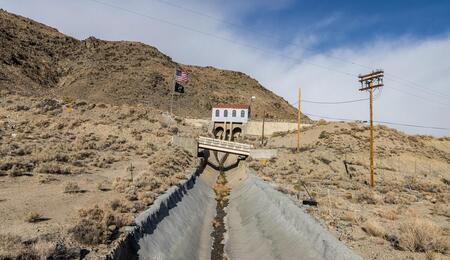Californians Propose Higher Fines for Illegal Grows, Water Theft

Illegal cannabis grows are putting an additional strain on California's water system amid historic droughts attributed to climate change. Two bills were recently introduced to prevent unlawful cannabis operations, both sponsored by California's San Bernardino County.
Illicit cannabis grow operations are depleting more water than ever as California droughts intensify.
San Bernandino County is sponsoring state legislation that aims to increase fines for illicit growing efforts and target unlawful entities that are polluting groundwater.
The first of the two newly sponsored bills, AB 2728, seeks to add an additional civil penalty based on the size of the illicit cultivation effort. The bill distinguishes between minor infractions and larger, industrial-scale illegal grows.
The second bill, SB 1426, is more orientated to the environmental damage and unique water-related crimes of illegal cannabis farms, including the theft or pollution of groundwater, installment of unauthorized infrastructure, digging wells without permission, and excessive use of hazardous chemicals, herbicides and pesticides.
San Bernandino County representatives also seek $10 million in state funding to restore hundreds of sites damaged by illegal cannabis operators. The County's Code Enforcement teams have been actively working on some of these sites, however, if granted, additional funding will significantly facilitate their efforts.
"Illegal cannabis farming is devastating the desert communities of San Bernandino County," said in a statement Supervisor Curt Hagman, Chairman of the Board of Supervisors. "The County is determined to stop this terrible damage to the environment and to protect the lives and property of our residents from lawless criminals."
California voters approved Proposition 64 in 2016, which paved the way for the adult-use cannabis market in the Golden State. The ballot measure gave several cannabis freedoms to users, including the possibility to grow up to six plants for personal use. However, the measure has also reduced the penalty for illegal cannabis cultivation from a felony to a misdemeanor. The law has effectively prevented local authorities from jailing repeat offenders and discouraging illegal cannabis farming.
In the words of Supervisor Dawn Rowe, Vice Chair of the Board of Supervisors, "California law on cannabis crimes lacks serious penalties."
"If someone grows 7,700, or 70,000 cannabis plants without a license the punishment is all the same – it is a misdemeanor. State law needs real punishments to eliminate large-scale illegal cannabis farms or rural Californians will continue to suffer," Rowe said.
Creating a new set of penalties for cannabis crimes is the primary purpose of bill AB 2728, which has been authored by Assemblymember Thruston Smith, a representative of the Victor Valley cities in the State Assembly.
Assemblymember Thruston's bill would increase the fines for illegal grows to $1,000 for each day of violation. In addition, it will cost $2,500 for each acre-foot of water diverted or, alternatively, $500 per plant (if the previous measurement is not specified).
Such stipulations would be effective in a "critically dry year immediately preceded by two or more consecutive below normal, dry, or critical dry years" and when the California state governor declares a state of emergency. The bill was referred to a committee on June 1.
"The people of California let their voices be heard and chose to decriminalize cannabis. I support their choice. However, what they didn't ask for was rampant cultivation and an illegal market sucking up resources, destroying the environment, and putting our communities at risk," said Thurston when he introduced the bill earlier this year.
On the other hand, SB 1426 is backed by State Senator Anna Caballero of Salinas. This is the bill that aims to penalize environmental crimes related to illicit farming. As of May 19, it has the status "Held in committee and under submission."
"Illegal cannabis farming is killing wildlife and wreaking environmental damage across the state," Caballero said. "This bill will help stop the pollution of our groundwater supply and the theft of water, which are all the more important during an ongoing multi-year drought."
Last year, California Governor Gavin Newsom appealed to residents to reduce water use by 15%. His plea came after he issued a state of emergency because of drought three times in a row during the summer and spring seasons of 2021. Earlier this spring, the governor asked local water agencies to put more aggressive efforts into water conservation.
While illegal cannabis operations in California are devastating for the environment, they are also a source of other problems. California's black market is siphoning millions from legal sales, and the most affected by this are small farmers who typically have high costs to keep their businesses going.
Californian regulation works well for corporate weed, but it does little to protect Ma and Pa shops. Craft cannabis producers compete both with big brands and the growing number of unlicensed dealers next door who undersell them because they don't need to pursue lab tests or pay any taxes.
Drought may have prompted bills AB 2728 and SB 1426, and if voted, the new legislation may work well to bring environmental justice. However, everyone would agree that California needs a broader, more comprehensive cannabis reform. State authorities need to subdue the black market and balance out the legal market, all while installing additional legal protections and incentives for responsible craft cannabis growers.







